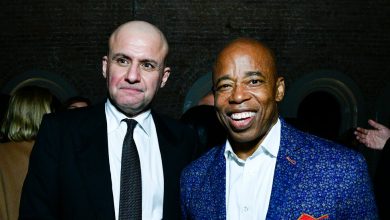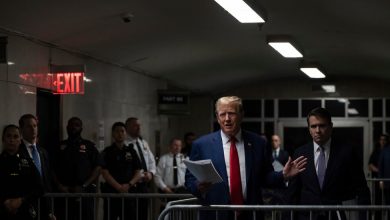Dilemma for Judge in Trump Case: Whether to Muzzle the Former President

As a former president and the de facto leader of the Republican Party, Donald J. Trump is one of the most powerful people in America.
But as a criminal defendant within the confines of the Manhattan courtroom where the case against him will play out for months to come, Mr. Trump is under the authority of someone else: the presiding judge, Juan M. Merchan.
The two men came face-to-face on Tuesday, after prosecutors with the Manhattan district attorney’s office unveiled 34 felony charges against Mr. Trump. When the prosecutors raised some of the former president’s recent social media posts, including one warning that “death and destruction” could follow if he were charged, Justice Merchan asked that Mr. Trump refrain from making comments that were “likely to incite violence or civil unrest.”
But after the hearing, Mr. Trump returned to Florida and to his old habits, calling the district attorney, Alvin L. Bragg, a “criminal,” and Justice Merchan himself “a Trump-hating judge with a Trump-hating wife and family.”
Justice Merchan’s warning and Mr. Trump’s reaction later that evening provided dueling examples of what will almost surely be a delicate dance. The former president, who is running to take back the White House, will have to appeal to a political base that feeds on his unrestrained rhetoric without crossing a line that might cause the judge to take action against him.
If Mr. Trump does cross that line, Justice Merchan will have to be careful in how he responds, to avoid any appearance of bias. He has the rare power to constrain the former president’s speech. The question will be whether and how to use it.
“A judge in this situation would have to discipline themselves constantly and try to act and respond to the situation as they would to any defendant facing these charges,” said Barry M. Kamins, a former administrative judge of New York City’s criminal courts. “I know it sounds like a herculean task to do that, but I think a judge has to be able to do exactly what he would do in any other case.”
Mr. Trump, who on Tuesday pleaded not guilty to 34 counts of falsifying business records related to a 2016 hush-money payment made to a porn star on his behalf, has the same rights the U.S. Constitution guarantees to any defendant. He has freedom of speech, the right to a fair trial and is innocent until proven otherwise.
But judges have significant power over defendants who appear before them, and Justice Merchan would have several means of disciplining Mr. Trump, if he deems it necessary.
“I am sure Justice Merchan wants to avoid a real confrontation, if that is humanly possible, but he will want to assert the authority of the court,” said Michael J. Obus, a judge who served in State Supreme Court for more than two decades and who has known Justice Merchan for about 14 years.
Though judges often act on their own accord, they sometimes exercise their powers over a defendant after prosecutors ask them to do so. On Tuesday, one of the prosecutors, Catherine McCaw, said that her team was in talks with Mr. Trump’s lawyers over a draft protective order that would limit how the former president uses evidence and other case material shared with his lawyers.
Prosecutors are seeking to bar him from reviewing the material without his lawyers present, and from sharing the material with third parties, including the press or his social-media following. If he were to violate such an order, he could be held in contempt of court, Ms. McCaw said.
But Mr. Trump’s defense lawyers have since decided that they’re going to oppose the proposed order, and the matter likely will be subject to litigation, according to a person with knowledge of the matter.
Current and former judges said that Justice Merchan, who has been on the bench in New York State Supreme Court since 2009, would almost certainly take other steps before he even considered placing Mr. Trump in contempt of court.
He could admonish Mr. Trump or ask that the former president return to court in person earlier than Dec. 4, his next scheduled appearance date. Only if the former president continued to lash out might he think about harsher punishments.
One of those, raised in advance of Tuesday’s hearing by some of Mr. Trump’s associates, could be a gag order, a catchall term for an order limiting what a defendant — or often a defendant’s lawyer — can say to the public. Judges are usually hesitant to impose such orders and do so only to prohibit specific types of speech.
“Certainly, the court would not impose a gag order at this time even if it were requested,” Justice Merchan said during Mr. Trump’s arraignment. “Such restraints are the most serious and least tolerable on First Amendment rights. That does apply doubly to Mr. Trump, because he is a candidate for the presidency of the United States.”
When prosecutors raised the subject of the social media posts from Mr. Trump, Justice Merchan’s response — asking Mr. Trump’s legal team to warn the former president against making such comments — seemed to reflect the judge’s intention to exercise his authority in stages.
“This is a request I’m making,” he said. “I’m not making it an order.”
If Justice Merchan were to find Mr. Trump in contempt of court, he would have the power to fine the former president up to $1,000, or even to jail him for 30 days. But experts said the possibility of that happening is very slim.
“The judge can put him in jail but that would absolutely be the last resort, because it would just make matters worse,” Judge Kamins said.
Justice Merchan has been under the protection of armed court officers at least since the grand jury voted to indict Mr. Trump on March 30, according to a person familiar with the arrangements.
One person who knows the judge said his chambers have been flooded with calls of support from colleagues and others, as well as angry calls from supporters of the former president, and many of those calls have included threats.
For decades, Mr. Trump has taken a keen interest in the judges presiding over civil cases that have involved him. Longtime associates recall Mr. Trump invoking Roy M. Cohn, his former fixer and lawyer, when arguing about the importance of the judge in charge of any case.
The former president often suggests judges hearing cases are too biased to continue, as he has with Justice Merchan. People familiar with Mr. Trump’s thinking say he believes he can get the judge to recuse himself. He may seize on public records which show that, during the 2020 presidential election, Justice Merchan donated $15 to the Democratic group Act Blue earmarked for Mr. Trump’s opponent, Joseph R. Biden Jr., as well as $10 each for two other Democratic groups, including one called Stop Republicans.
Before he was arraigned, Mr. Trump attacked Justice Merchan by his full name: Juan Manuel Merchan. Justice Merchan was born in Bogotá, Colombia. He came to the United States with his family when he was 6 years old, grew up in Queens and began his legal career in 1994 as an assistant district attorney in Manhattan.
Last fall, he presided over the trial of Mr. Trump’s family business, The Trump Organization, which in December was convicted of 17 felonies. He is currently overseeing a case the district attorney’s office brought against Steve Bannon for defrauding contributors to an organization that sought to help construct a wall along the southern border.
Though Justice Merchan typically appears sober and even-keeled, lawyers for Mr. Trump’s company and Mr. Bannon have at times tested him. During the trial of the Trump Organization, he appeared to grow frustrated with two of Mr. Trump’s lawyers after they made vulgar references and gestures in closing arguments. Eventually he told another lawyer representing the company to tell them to “refrain from the improper decorum that’s going on.”
He had even less patience for David Schoen, a lawyer for Mr. Bannon. A January hearing at which Mr. Schoen was seeking to be removed from the case included several fiery exchanges between Justice Merchan and Mr. Schoen.
At the end of the hearing, the judge told the lawyer that “you never need come back.”
Maggie Haberman contributed reporting. Susan C. Beachy contributed research.




